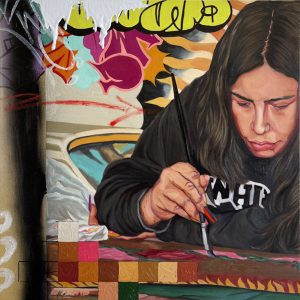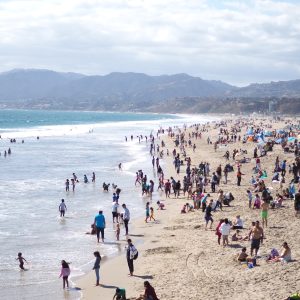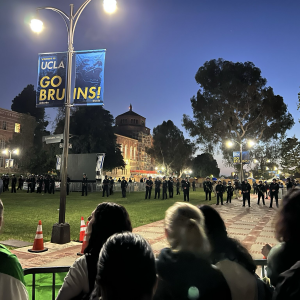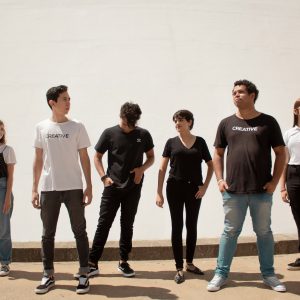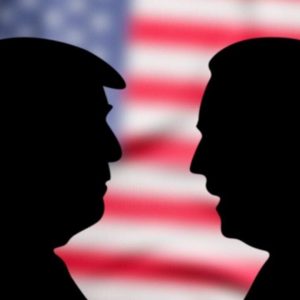 View Winners →
View Winners → 
While he is not directly named in the indictment alleging ex-President Donald Trump conspired to attempt to overturn the election of President Joe Biden, language in the charging document released Tuesday indicates that one of six unnamed alleged co-conspirators is former Chapman University Law School professor John Eastman.
The grand jury indictment of Trump quotes a speech by Eastman given on Jan. 6, 2021, before many in the crowd marched on the Capitol and rioted.
“All we are demanding of Vice President (Mike) Pence is this afternoon at 1 p.m. he let the legislatures of the state look into this so we get to the bottom of it and the American people know whether we have control of the direction of our government or not,” the indictment quotes “co-conspirator 2” telling the crowd. “We no longer live in a self-governing republic if we can’t get the answer to this question.”
Eastman was one of the architects of a plan to gather an alternative slate of electors in swing states where Biden won to either replace the ones who voted to certify Biden’s election or to create enough debate that Pence could send the issue back to those states and stall the finalization of Biden’s victory. In recent weeks, Eastman has defended his role in the plan as the state Bar of California considers yanking his law license. More hearings are slated for later this month.
The role Eastman played in the election as attorney for Trump also came to the fore in the Jan. 6 congressional hearings when Eastman sued Chapman University to block officials from releasing his e-mails to the congressional committee. In that civil case, U.S. District Judge David O. Carter ruled that thousands of those emails should be turned over despite Eastman’s claim of attorney-client privilege because of a “crime fraud exception.”
Eastman and his attorneys did not immediately respond to messages for comment.
In the indictment of Trump released Tuesday, Special Counsel Jack Smith describes co-conspirator 2 as “an attorney who devised and attempted to implement a strategy to leverage the vice president’s ceremonial role overseeing the certification proceeding to obstruct the certification of the presidential election.”
In the indictment, co-conspirator 2 is accused on Jan. 4, 2021, of calling the “Arizona House Speaker to urge him to use a majority of the legislature to decertify the state’s legitimate electors. Arizona’s validly ascertained electors had voted three weeks earlier and sent their votes to Congress, which was scheduled to count those votes in Biden’s favor in just two days’ time at the January 6 certification proceeding. When the Arizona House Speaker explained that state investigations had uncovered no evidence of substantial fraud in the state, Co-Conspirator 2 conceded that he ‘(didn’t) know enough about facts on the ground’ in Arizona, but nonetheless told the Arizona House Speaker to decertify and ‘let the courts sort it out.'”
Some of the issues being covered in the state Bar hearing were also touched on in the indictment. For instance, Smith refers to an inaccurate accounting from a so-called elections expert in a lawsuit filed in Georgia that was signed off on by Eastman. Carter also referenced the same incident in his ruling.
“Co-Conspirator 2 — who was advising the defendant on the lawsuit — acknowledged in an email that he and the defendant had, since signing a previous verification, ‘been made aware that some of the allegations (and evidence proffered by the experts) has been inaccurate’ and that signing a new affirmation ‘with that knowledge (and incorporation by reference) would not be accurate,” the indictment alleges. “The defendant and Co-Conspirator 2 caused the defendant’s signed verification to be filed nonetheless.”
In the state Bar hearing, Eastman said he relied on his expert Bryan Geels, who merged two sets of numbers on a spreadsheet that incorrectly displayed 66,247 underage Georgia residents were illegally allowed to register to vote in the 2020 election. That was later revised down by about 2,000 by Eastman’s expert.
Georgia Secretary of State Brad Raffensperger, who said no underage teens were allowed to vote, also challenged Eastman’s other statistics, including that 2,500 felons were allowed to vote when it was actually 74, state Bar prosecutor Duncan Campbell Carling established under questioning.
Eastman accused Raffensperger of mischaracterizing what he said.
“Mr. Geels’ report never said underage teenagers voted,” Eastman testified, adding that Geels said some teens, who are allowed to register if they are 17 and a half, were allowed to register when they were 16.
“I referred to the expert, and all of those were based on caveats that we weren’t able to complete our analysis,” Eastman said.
Eastman said he was “on the receiving end of a lot of information” at the time, and added that he was also ailing from a COVID-19 infection in the latter half of December 2020.
“I was a little bit under the weather with a 104 temperature,” Eastman said.
In that hearing, Eastman defended his claim that voter fraud could pave the way for seating a different set of electors.
“It is uncharted territory,” Eastman said.
“I was not encouraging or discouraging” the discussion on seeking alternate slates of electors favorable to Trump, Eastman said in the state Bar hearing. “I was rendering a requested legal opinion.”
Smith also refers to a call Trump and Eastman made to Ronna McDaniel, the chairwoman of the Republican Party, on Dec. 6 about the plan to slate alternate electors.
“During the call, Co-Conspirator 2 told the Chairwoman that it was important for the RNC to help the defendant’s campaign gather electors in targeted states, and falsely represented to her that such electors’ votes would be used only if ongoing litigation in one of the states changed the results in the defendant’s favor,” the Trump indictment alleges.
The indictment further alleges that on Dec. 23, 2020, “Co-Conspirator 2 circulated a two-page memorandum outlining a plan for the vice president to unlawfully declare the defendant the certified winner of the presidential election. In the memorandum, Co-Conspirator 2 claimed that seven states had transmitted two slates of electors and proposed that the vice president announce that ‘because of the ongoing disputes in the seven states, there are no electors that can be deemed validly appointed in those states.'”
The indictment also alleged that “Co-Conspirator 2 proposed steps that he acknowledged violated the (Electoral Count Act), advocating that in the end, ‘Pence then gavels President Trump as re-elected.'”
The indictment points out that in October, “Co-Conspirator 2 had taken the opposite position, writing that neither the Constitution nor the ECA provided the vice president discretion in the counting of electoral votes, or permitted him to ‘make the determination on his own.'”
On Jan. 3, 2021, “Co-Conspirator 2 circulated a second memorandum that included a new plan under which, contrary to the ECA, the vice president would send the elector slates to the state legislatures to determine which slate to count,” the indictment alleges.
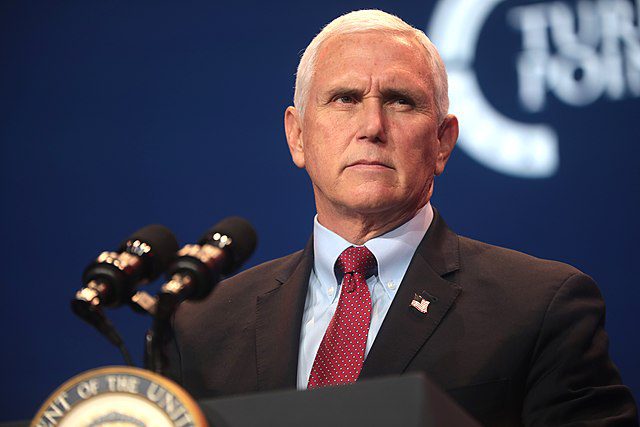
The indictment also refers to a Jan. 4, 2021, meeting that included Trump, Pence, his chief of staff and counsel, to convince Pence to either reject the electors or send them back to the seven states where Biden’s victory was close.
When Pence challenged whether he had that authority, “Co-Conspirator 2 responded, ‘Well, nobody’s tested it before,'” according to the indictment.
During the discussion, Eastman conceded that his plan would not survive a challenge in the U.S. Supreme Court, prompting a senior adviser to President Trump to tell “Co-Conspirator 2, ‘You’re going to cause riots in the streets,'” the indictment alleges.
“Co-Conspirator 2 responded that there had previously been points in the nation’s history where violence was necessary to protect the republic,” the indictment alleges. “After that conversation, the senior adviser notified the defendant that Co-Conspirator 2 had conceded that his plan was ‘not going to work.'”
At another meeting the next day, “Co-Conspirator 2 now advocated that the vice president do what the defendant had said he preferred the day before: unilaterally reject electors from the targeted states. During this meeting, Co-Conspirator 2 privately acknowledged to the vice president’s counsel that he hoped to prevent judicial review of his proposal because he understood that it would be unanimously rejected by the Supreme Court. The vice president’s counsel expressed to Co-Conspirator 2 that following through with the proposal would result in a ‘disastrous situation’ where the election might ‘have to be decided in the streets.'”
Pence attorney Greg Jacob testified about this exchange during the disbarment hearing for Eastman. The two got into a nasty email exchange as the riots broke out while Jacob was scrambling to find refuge along with Pence.
Jacob testified that he did extensive legal and historic research on the issue, including review of congressional records and concluded all Pence had the authority to do was open the envelope containing the electors and having them counted. He characterized it as a “ministerial” role.
Jacob pointed out that when a dispute arose in Hawaii in the 1960 election then-Vice President Richard Nixon, who lost to President John Kennedy, opened three envelopes of slates of electors and to save time said he believed the one favoring Kennedy was the correct one and Congress did not oppose it.
Jacob also pointed out that no governor had signed off on any competing slates of electors, including Republican ones.
The Trump indictment also refers to an email Eastman sent to Jacob imploring Pence to “violate the law and seek further delay of the certification” on Jan. 6.
Co-Conspirator 2 wrote, “I implore you to consider one more relatively minor violation (of the ECA) and adjourn for 10 days to allow the legislatures to finish their investigations, as well as to allow a full forensic audit of the massive amount of illegal activity that has occurred here,” the indictment alleges.











